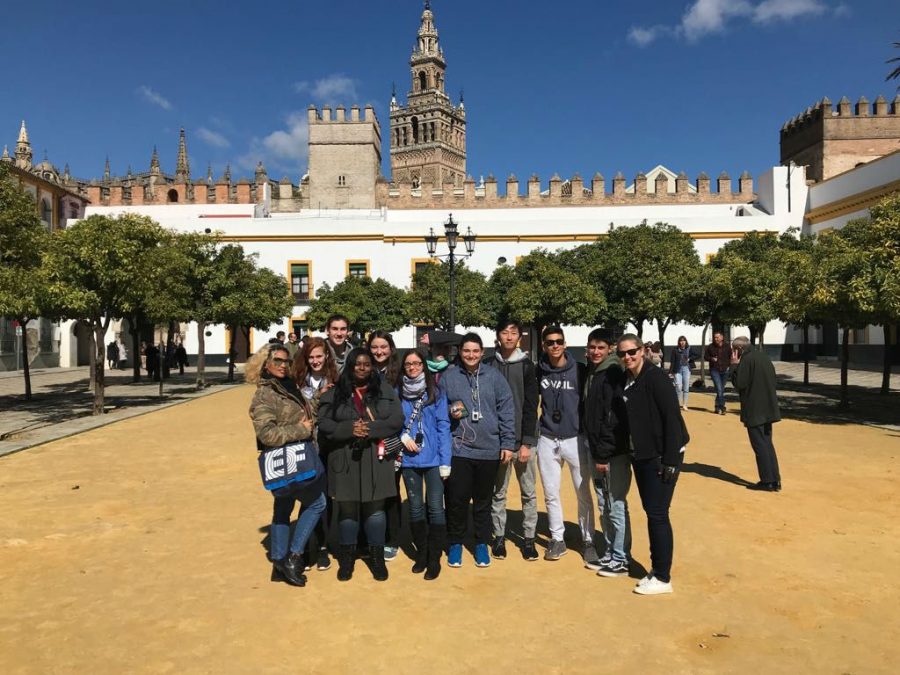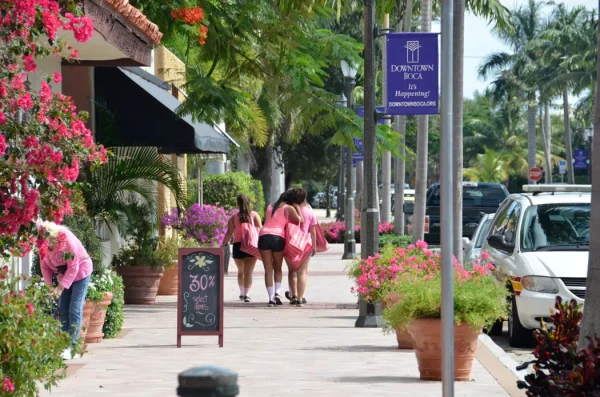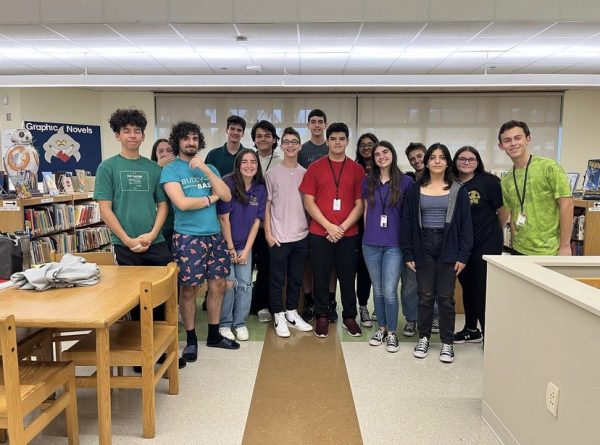Thinking About an “Educational Tour”? A Little Advice Before Shelling Out the Big Money
Olympic Heights students and group leaders pose in front of the Alcazar Palace in Seville, Spain, one of the many points of interest visited during a 2018 Spring Break EF Educational Tour.
Traversing the world with friends sounds like a dream come true for most people. For this reason, school trips can be an enticing option for teens who are eager to travel independently from their parents and want to spend time with their friends. And students are afforded such an opportunity through a company called EF Educational Tours.
Though EF Educational Tours operates independently of the School District of Palm Beach County and its schools and the trips are not associated or endorsed by the district, EF uses teachers as “group leaders” for chaperoning and soliciting their school’s students to purchase the trips through EF.
Over the past spring break, I along with nine other Olympic Heights students, partook in one such journey to Spain and Portugal with Ms. Sarah Gregory and Ms. Amanda Aiello as group leaders. Hopefully, my first-hand experience can provide some insight for students who are considering travel with EF in the future.
Our trip was nine days long; however, our first, second, and ninth days were occupied solely with flying and traveling. Therefore, we technically were only left with six full days to do activities in Portugal and Spain. Most students from the group felt exhausted and ready to go home by the end of that period, so it was actually fitting that the trip was not any longer.
But, if you know that you would like to travel for a longer period or visit more places in depth, be aware that EF trips are on a tight schedule. It might be better for you to plan a trip of your own where you can spend as many days doing whatever you like in the cities of your choosing.
Each day of the EF tour is meticulously planned to include a multitude of activities. Most days, the group left the hotel at around 8:30am. A charter bus specifically for our travel group would take us to our destinations and walking tour locations. The local tour guides make sure to show the most notable attractions in each city, but because of the fast pace, you might not be able to look at everything for as long as you would like to.
Our group had two-to-four hours of allotted free time most days. During free time, students have the freedom to explore a bit on their own. Naturally, students are required to be accompanied by at least one other student at all times, and they cannot venture beyond a certain area, like a plaza or street. The general consensus seems to be that people’s favorite part of the trip was the free time. Everyone enjoyed roaming the plethora of shops and restaurants that line the narrow, busy streets of the Spanish and Portuguese cities. Most of my group’s free time was spent searching for restaurants to eat lunch, leaving only enough time to wander and go souvenir shopping. It is unlikely you would have ample free time to visit a museum or other attraction.
Speaking of food, the EF tour includes two meals a day. Usually this means breakfast and dinner are served at the hotel, or perhaps the group will go to a restaurant for dinner. It is up to the students to find something to eat for lunch on their own. The breakfasts at hotels were pretty good with there typically being various breads, pastries, and fruits available. As for dinner, most students will say it was not the greatest. Everyone was served the same menu, so if you didn’t like what was being served, you’d have to get something else and pay out of your own pocket. I can attest that the dinners were not always the best quality, as I got food poisoning after an evening at a restaurant.
Another detail to consider is that you will have to room with other people. In the three hotels we stayed at, there were either rooms for three or four people. There was always only one bathroom for all roommates to share, and most of the time the beds were all in the same relatively small room. A suite with separate bedrooms is quite rare in European hotels, which tend to be small. As for roommates, you can choose to be with your friends and people from your school’s group, but if there are vacancies to be filled, you will be paired up with people from other groups that are on the same EF trip.
I would definitely only go on this type of trip with close friends I know I’d want to room and spend my time with. Otherwise, you might end up paired with strangers from different schools and even different states. On one hand, this could be a great way to meet new people, but if you are not the outgoing and social type, it might just make for an uncomfortable situation.
A positive aspect about traveling with EF is that there are local tour guides wherever you go, and you are almost always surrounded by people who know how to speak some English. People worried about a language barrier needn’t be concerned at all. Having a tour guide for every city is helpful because they explain things that you probably never would’ve known if you visited on your own.
Many people, especially the adults on the trip, enjoy that EF takes care of almost everything for you. They find it relaxing to not have to plan their own itinerary. You just hop onto the provided charter bus, and the tour director takes you where you need to go! You are taken to the main tourist attractions where you usually get to skip the long waiting lines, and they make sure to build in fun extra activities as well. For example, after a day of touring the royal palace and cathedral in Seville, we were treated to a flamenco lesson and dance show in the evening. Activities like these contribute to a unique experience that you might not get if you were to organize your own trip.
For parents, cost is likely the ultimate determining factor as to whether or not they will send their children on a trip. Our “nine” day trip to Portugal and Spain cost nearly $3000. This doesn’t account for the cost of mandatory tips and any other money you might spend. Personally, I spent roughly $150 on souvenirs and meals for the entirety of the trip, but I was a conservative spender compared to most of the other students.
For those wondering how much a plane ticket costs if you were to purchase one for your own travels, a round trip flight from Miami to most major European cities, such as Madrid, typically costs $700 to $1000. Hotel rooms in most cities cost approximately $100 a night, though if you want, you can always find something cheaper or far more expensive. This usually gets you a four-person room and includes breakfast and Wi-Fi. So for almost the same money that it costs to send one child on an EF trip, theoretically a family of three could pay for their flights and hotel stays. Obviously the family would still have additional expenses from purchasing food, souvenirs, and entrance tickets and paying for a car rental or other mode of transportation.
In final consideration, I would recommend traveling with EF or going on similar school trips if it is your first time traveling abroad by yourself. This is because you will have a degree of freedom and maturity, but there are still other people present who look out for you and guide you. It is a good way to get a feel for international traveling, and it can be especially fun if you are traveling with friends.
However, if you’re already familiar with traveling abroad, and especially if you can understand the language in the foreign country, I think you might have a more enjoyable time traveling on your own or with family. Traveling independently from a tour group gives you the possibility to take your time and choose your own schedule and destinations, which means you may have a more relaxed experience.
It is up to each individual student and their family’s personal and financial situation to decide which method of travel is best suited to them. The most important thing is that you are able to expand your worldview and gain cultural experiences in your lifetime. Renowned travel writer and television host Rick Steves says it best: “Keep on traveling!”















